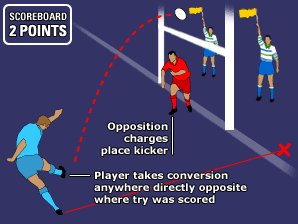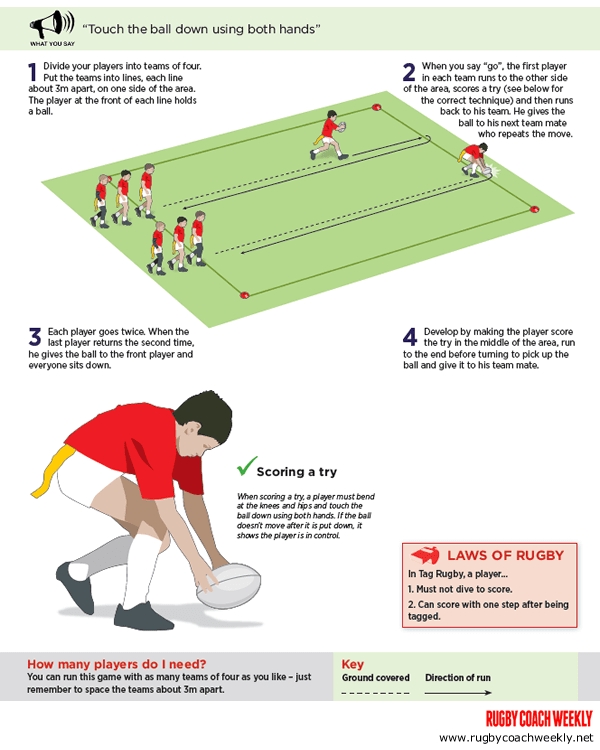Scoring in rugby involves grounding the ball in the opponent’s in-goal area. This can be tricky for beginners.
Rugby is an exciting and fast-paced sport with unique rules. Knowing how to score is key to enjoying and excelling in the game. Understanding the different ways to score points, such as tries, conversions, penalties, and drop goals, can make a huge difference.
This guide will break down each method simply and clearly. You will learn the basic rules and techniques needed to score effectively. Whether you are new to rugby or looking to improve your skills, this introduction will help you grasp the essentials. Let’s dive into the thrilling world of rugby scoring!
Introduction To Rugby Scoring
Rugby is a thrilling sport that captures the hearts of many. Understanding how to score in rugby is key to appreciating the game. Scoring in rugby involves different methods, each with its own rules and points. This introduction will help you grasp the basics of rugby scoring.
Basic Scoring Methods
Rugby offers several ways to score. The most common is the try. A try is worth five points. To score a try, a player must ground the ball in the opponent’s in-goal area. After scoring a try, a team can attempt a conversion kick. A successful conversion kick adds two points. The ball must pass between the goalposts and above the crossbar.
Another scoring method is the penalty kick. This is worth three points. A penalty kick is awarded for certain rule violations by the opposing team. The player kicks the ball from the spot of the infringement. Finally, there is the drop goal. A drop goal is also worth three points. The player must drop the ball and kick it as it bounces. The ball must go between the goalposts and over the crossbar.
Importance Of Scoring
Scoring is crucial in rugby. It determines the winner of the match. Each point can change the outcome. Teams must focus on scoring to gain an advantage. Good scoring strategies can lead to victory. It also boosts team morale. Players feel motivated by scoring points. Fans enjoy the excitement of scoring moments. Understanding scoring enhances the enjoyment of rugby.
Understanding Tries
In rugby, a try is one of the most exciting ways to score. It requires skill, strategy, and teamwork. When a player grounds the ball in the opponent’s in-goal area, it is called a try. A try is worth five points. This makes it a significant part of the game. Let’s explore how to score a try and effective try-scoring strategies.
How To Score A Try
Scoring a try involves carrying the ball over the opponent’s goal line. The ball must be grounded in the in-goal area. Here are key steps:
- Run towards the opponent’s in-goal area.
- Dodge defenders using speed and agility.
- Ground the ball with downward pressure to score.
Remember, the ball must be touched down with control. It should not be dropped or lost.
Effective Try-scoring Strategies
To score a try, teams use various strategies. These strategies involve teamwork and precise execution:
- Offload passes: Pass the ball to a teammate to keep the play alive.
- Support play: Stay close to the ball carrier for quick passes.
- Set plays: Use pre-planned moves to break through defenses.
Using these strategies can increase your chances of scoring tries. Here is a quick comparison of their effectiveness:
| Strategy | Effectiveness |
|---|---|
| Offload passes | High |
| Support play | Medium |
| Set plays | Variable |
By mastering these strategies, you can help your team score more tries.
Kicking For Points
Kicking for points is an essential skill in rugby. It can make the difference between winning and losing. Understanding the types of kicks and techniques can boost your game.
Types Of Kicks
There are different types of kicks in rugby. Each has its own purpose. The main types include place kicks, drop goals, and conversions. Place kicks are often used for penalty goals. Drop goals happen during open play. Conversions follow a try to add extra points.
Techniques For Successful Kicks
Techniques are crucial for successful kicks. For place kicks, focus on your stance. Keep your non-kicking foot beside the ball. Swing your kicking leg smoothly. Aim for the sweet spot on the ball.
For drop goals, practice timing. Drop the ball so it bounces as you kick. Keep your eyes on the ball. Follow through with your leg.
Conversions need accuracy and power. Position the ball on the tee. Take a few steps back. Run up and strike the ball with the top of your foot.
Practice these techniques regularly. Improve your kicking accuracy and consistency. Kicking well can score many points for your team.

Credit: www.youtube.com
Mastering Conversions
Mastering conversions is key to scoring in rugby. After scoring a try, players have a chance to add extra points through a conversion kick. This skill can greatly influence the outcome of a match. Let’s explore how to master conversions in rugby.
Conversion Rules
Understanding conversion rules is essential. The conversion kick must be taken from a spot in line with where the try was scored. The kicker has 90 seconds to take the kick once the try is awarded.
Points awarded for a successful conversion are:
- 2 points in Rugby Union
- 1 point in Rugby League
Improving Conversion Success
Improving conversion success requires practice and technique. Here are some tips:
- Stance and balance: Keep your body balanced. Your feet should be shoulder-width apart.
- Focus: Concentrate on the ball and your target. Visualize the ball going through the posts.
- Follow-through: Ensure your follow-through is smooth. Your kicking leg should swing freely.
- Practice: Regularly practice conversion kicks. Repetition builds muscle memory.
A table summarizing key points:
| Element | Key Point |
|---|---|
| Stance and balance | Feet shoulder-width apart |
| Focus | Visualize success |
| Follow-through | Smooth and free |
| Practice | Regular repetition |
By following these tips, players can improve their conversion success. This can lead to higher scores and better performance in matches.
Executing Penalty Goals
Executing penalty goals is a crucial skill in rugby. A well-timed penalty kick can change the game’s outcome. It can give your team the lead or secure victory. This section will help you understand when to take a penalty kick and provide tips for accurate penalty goals.
When To Take A Penalty Kick
A penalty kick is awarded for various infractions. Common reasons include offside, high tackles, or not releasing the ball. The decision to kick or not depends on the situation. If within the opponent’s 22-meter line, a penalty kick is often a good option. It offers a straightforward chance to score three points.
Consider the score and time left in the match. If your team is behind, a penalty goal can close the gap. If leading, it can extend your advantage. Assess the weather and ground conditions. Wet or windy conditions can make kicking more difficult. Communicate with your teammates and coach. Their input can help you decide the best course of action.
Tips For Accurate Penalty Goals
Accuracy is key in penalty kicks. Start with a proper stance. Place your non-kicking foot next to the ball. Keep your eyes on the ball. Focus on the spot you want to strike. Follow through with your kick. This adds power and accuracy.
Practice regularly to improve your consistency. Work on your mental focus. Visualize the ball going through the posts. Stay calm under pressure. Deep breathing can help control nerves. Use the same routine for each kick. Consistency in your approach builds confidence.
Understand the wind direction. Adjust your aim accordingly. On windy days, aim slightly to the left or right. This compensates for the wind’s effect. Maintain good posture. Keep your body aligned with the target. This ensures a straight and powerful kick.
Remember, penalty goals are a valuable scoring opportunity. Mastering them can make a significant difference in your rugby performance.
Drop Goals Explained
Scoring in rugby can be challenging. One way to score is through a drop goal. This method requires skill and precision. It is worth three points and can change the game. A drop goal is made by kicking the ball after it touches the ground. Timing and practice are key.
Timing For Drop Goals
Choosing the right time to attempt a drop goal is crucial. The best moments are usually when the defense is spread out. This creates space for a clear kick. Players should also look for opportunities when they are near the opponent’s 22-meter line.
Teams often prepare for drop goals during critical moments. These can be near the end of a match. Or when a quick score is needed. Practicing timing can help players recognize these moments. Reacting quickly and confidently is essential.
Practicing Drop Goals
Practice is vital for executing a successful drop goal. Start by mastering the basic technique. The kicker should focus on their foot placement and follow-through. Consistency is key. Repetition helps build muscle memory.
Here are some tips for practicing drop goals:
- Practice with different distances and angles.
- Work on kicking under pressure.
- Simulate game scenarios with teammates.
Regular practice can improve accuracy. It also boosts confidence during a match. Coaches should include drop goal drills in training sessions. This helps players become more comfortable with the technique.
Teamwork And Communication
Rugby is a dynamic and challenging sport that requires more than physical strength and speed. Teamwork and communication play a crucial role in scoring. Players need to work together and communicate effectively to outsmart the opposition and reach the try line. This section will discuss the importance of coordinating with teammates and effective on-field communication.
Coordinating With Teammates
Coordination is key in rugby. Each player has a specific role. Understanding these roles helps the team move as one unit. Forwards and backs must sync their movements to create opportunities.
Practicing set plays can improve coordination. Set plays are pre-planned strategies used during a game. They involve specific movements and passes. Consistent practice helps players execute these strategies smoothly.
Another important aspect is supporting the ball carrier. Teammates should always be ready to receive a pass. This keeps the ball moving and confuses the opposition. Good coordination ensures that the team maintains momentum and pressure.
Effective On-field Communication
Communication on the field is essential. Players must talk to each other constantly. Simple phrases like “pass,” “run,” or “support” can make a big difference.
Non-verbal communication is also important. Hand signals and eye contact can convey messages quickly. Players should develop their own set of signals for faster communication.
Another technique is using code words for set plays. These words are unique to the team and help in executing strategies without alerting the opposition.
Clear and concise communication reduces mistakes. It ensures that all players are on the same page. This unified approach can lead to more scoring opportunities.
Summary Table:
| Aspect | Details |
|---|---|
| Coordinating with Teammates | Understanding roles, practicing set plays, supporting ball carrier |
| Effective On-Field Communication | Verbal communication, non-verbal signals, code words |

Credit: www2.gvsu.edu
Mental And Physical Preparation
Scoring in rugby requires more than just physical prowess. It demands a keen mental focus and exceptional physical conditioning. Both aspects play crucial roles in helping players perform at their best. By combining mental and physical preparation, players can enhance their skills and improve their chances of scoring.
Physical Fitness Tips
Building stamina is essential for rugby players. Regular cardiovascular exercises like running or cycling can help. Incorporate strength training to build muscle and increase power. Focus on exercises that mimic rugby movements. Squats, lunges, and deadlifts are great options. Flexibility is also important. Stretch regularly to prevent injuries and improve agility.
Mental Strategies For Focus
Mental preparation is just as important as physical fitness. Visualization can help. Imagine successful plays and scoring tries. This builds confidence. Positive self-talk can improve focus and reduce anxiety. Keep your thoughts encouraging and focused on your goals. Mindfulness and meditation can also aid concentration. Practice deep breathing exercises to stay calm under pressure.
Common Mistakes To Avoid
Scoring in rugby can be challenging for many players. It’s crucial to understand common mistakes that can hinder your performance. This section will help you identify these errors and provide tips to avoid them.
Frequent Scoring Errors
There are several errors players commonly make when trying to score. Understanding these can help improve your game:
- Incorrect positioning: Being out of position can ruin scoring chances.
- Poor ball handling: Dropping the ball or passing inaccurately wastes opportunities.
- Weak communication: Failing to communicate with teammates leads to missed chances.
How To Overcome Scoring Challenges
Overcoming scoring challenges requires focus and practice. Here are some tips:
- Improve positioning: Always be aware of your position on the field.
- Enhance ball handling: Practice passing and catching drills regularly.
- Boost communication: Talk to your teammates and signal your intentions.
Remember, avoiding these common mistakes can significantly improve your scoring ability in rugby. Consistent practice and teamwork are key to achieving success on the field.

Credit: www.rugbycoachweekly.net
Conclusion And Final Thoughts
Scoring in rugby requires skill, strategy, and teamwork. Understanding the different ways to score helps players and fans appreciate the game. Let’s recap the key points and encourage practice for mastery.
Summary Of Key Points
- Try: The most valuable score, worth 5 points, achieved by grounding the ball in the opponent’s in-goal area.
- Conversion: After a try, the team can attempt a kick for 2 extra points.
- Penalty Kick: A successful penalty kick is worth 3 points.
- Drop Goal: A drop goal can be scored during open play for 3 points.
Encouragement For Practice
To excel in rugby, practice is essential. Regular practice improves skills and teamwork. Here are some tips:
- Consistent Training: Dedicate time each week to practice.
- Team Drills: Work with your team to improve coordination.
- Focus on Techniques: Perfect your passing, kicking, and tackling.
- Watch Games: Learn from professional matches and apply new strategies.
Remember, scoring in rugby is a team effort. Keep practicing, stay dedicated, and enjoy the game!
Frequently Asked Questions
What Are The Main Ways To Score In Rugby?
In rugby, you can score through tries, conversions, penalty kicks, and drop goals. Each method has different point values.
How Many Points Is A Try Worth?
A try in rugby is worth five points. It’s the highest-scoring play in the game.
What Is A Conversion In Rugby?
A conversion is a kick taken after a try. It is worth two points if successful.
How Does A Penalty Kick Work In Rugby?
A penalty kick is awarded for certain fouls. If successful, it scores three points.
Conclusion
Scoring in rugby may seem challenging at first, but practice makes perfect. Understand the different scoring methods. Try conversions, drop goals, and penalty kicks. Work on your passing and teamwork. Stay focused during the game. Remember, every point counts. Keep learning, keep playing, and enjoy the sport.
Rugby is not just about winning. It’s about skill, strategy, and passion. Now, get out there and score some points!


